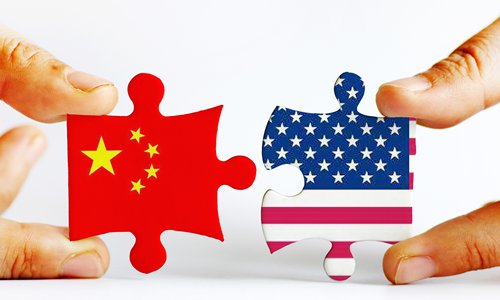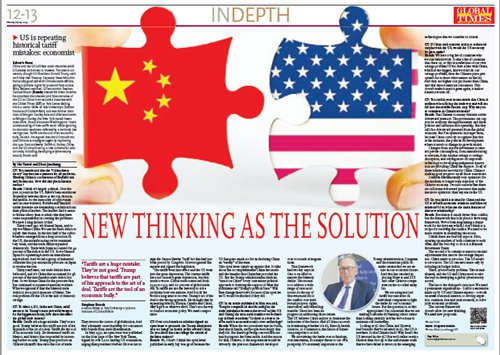HOME >> CHINA
Washington's tariffs are the tool of an economic bully: US economist
By Hu Yuwei and Zhao Juecheng Source:Global Times Published: 2019/7/21 18:03:40

Stephen Roach. Photo: Zhao Juecheng/GT
Editor's Note:
China and the US still face trade obstacles amid US anxiety and threat to Huawei. The deal is uncertain, though US President Donald Trump said on Friday that Treasury Secretary Steve Mnuchin had a very good talk with Chinese trade officials, giving a positive signal for potential face-to-face talks, Reuters reported. US economist Stephen Samuel Roach (Roach) shared his views on what he considers the inherent and false narrative of the US on China in an exclusive interview with the Global Times (GT) at Yale Center Beijing. He is a senior fellow at Yale University's Jackson Institute of Global Affairs, and was former chairman of Morgan Stanley Asia and chief economist at Morgan Stanley, the New York-based investment bank. Roach discusses Washington's "basic understanding of how tariffs work" while ignoring its domestic weakness reflected by a seriously low savings rate. Tariffs are the tool of an economic bully, he said. He argued that the US should not use China as a scapegoat again by replicating the 1930 Smoot-Hawley Tariff Act. Rather, China and the US should set up a new scheme for talks on trade, including developing a cybersecurity accord, Roach said.
GT: You mentioned that the "China threat theory" has become a panacea for all problems. Blaming China is a consensus of Republicans and Democrats. How did this phenomenon surface?
Roach: I think it's largely political. Over the past 25 years in the US, there's been enormous dispersion between those at the top, those in the middle. As the inequality of opportunity and income widened, workers and families under pressure are demanding a solution from their political leaders. The leaders find it easier to blame others than to admit that they have some responsibility in creating the problems. We have a long history of that.
Thirty years ago, we blamed Japan, and today we blame China. We use the trade deficit to justify that blame. In the first half of the 1980s when we emerged from a deep recession in the US, the manufacturing sector remained very weak, and the trade deficit expanded dramatically. Trade with Japan accounted for 42 percent of the deficit in the US. So we blamed Japan for squeezing American manufacturing workers. And we led a group of industrial countries that put enormous pressure on Japan to revalue the yen.
Thirty years later, our trade deficits have ballooned, and it's China that accounted for 48 percent of the merchandise trade deficit last year. So we blame China for the pressure that has continued to squeeze American workers. What we ignored is that the bilateral trade deficit is not a good measure of blame. The real problem for the US is the lack of domestic savings.
GT: To Mexico, EU, India and China, tariff seems to be Trump's most powerful weapon. As the biggest economy, how does this affect the global trade system?
Roach: Tariffs are a huge mistake. They're not good. Trump believes that tariffs are part of his approach to the art of a deal. Tariffs are the tool of an economic bully. He threatened tariffs on Mexico, and Mexico has responded by increasing border security. Trump puts pressure on China with tariffs that raise the cost of trade. They reverse the course of globalization. And they ultimately cause hardship for consumers who benefit from trade liberalization.
In May 1930, an open letter was published on the front page of the New York Times, signed by over 1,000 leading US economists, urging then president Herbert Hoover not to sign the Smoot-Hawley Tariff Act that had just been passed by Congress. Hoover ignored the experts and signed the legislation.
The tariffs went into effect and the US went into the great depression. The current tariffs have not caused a great depression, but they made it worse. Global trade contracted from 1929 to 1932, and 60 percent of global trade fell. So tariffs are not the best way to solve problems between nations. And it took the world a long time to recover. Trump's art of the deal is the wrong approach. He thought that by squeezing Mexico, Europe, Canada and China, they'll give us what we need. That's not the way to conduct economic policy. We need compromise.

Photo: VCG
GT: Over 100 American scholars signed an open letter to persuade the Trump administration to change its hostile policy toward China. Do you think this can change the minds of decision makers?
Roach: No, I don't. I think the open letter published in early July was good because the US has gone much too far in declaring China an "enemy" of the state.
This open letter stands up against that. It talks about the accomplishments China has made and the benefits that China has provided the US. But the Trump administration finds an "attack on China" a very convenient political approach to drawing the support of what the politicians call "Trump's political base." Will they change their views because of an open letter? I would be shocked if they did.
GT: In an article published in May, you said, "Despite a superficial deal focusing on the trade imbalance between the two of us [the US and China,] the structural conflict over technology is likely to endure." Is there is a way to resolve such a structural conflict over technology?
Roach: When the two presidents met in Osaka, they shook hands, and people were happy that they did. But there's growing concern that not much progress has been made. And the reason for that, I believe, is the negotiations would be driven by the previous framework developed over 11 rounds of negotiations.
That framework had two key aspects: One is an effort to narrow the bilateral deficit. The second is to address a wide range of structural issues. At the top of that structural list is the conflict over intellectual property rights, innovation, and technology transfer. There has been no progress in addressing those issues. The US believes China aspires to dominate the industries of the future. And if China succeeds in dominating, whether it's AI, Fintech, health sciences, or e-commerce, the future of American prosperity is at risk.
We are viewing the battle over technology, over innovation, as a major threat to our own prosperity. It's extremely important to the Trump administration, Congress and the American public to make certain that we are secure in our economic future. And that has resulted in placing Huawei and ZTE and other Chinese companies on the so-called entity list.
We are using not just tariffs but sanctions on individual companies to fight the battle for our economic future. But the question is, is this appropriate? I'm concerned that we are making a mistake by blaming others rather than looking carefully at what we've done to maintain our leadership.
Looking at 5G that China and Huawei lead because they've invested in 5G, the US is nowhere. Is that China's fault? Why hasn't the US invested in the 5G? But we'd rather restrict Huawei than face up to the unfortunate truth that we have failed to invest in the emerging technologies that we consider so critical.
GT: If China took concrete action to reduce its surplus with the US, would the US economy be great again?
Roach: We have a big list of countries who we run deficits with. Is this a list of countries that cheat us, or this is a reflection of our own savings problem? If we draw a line with China, which is the biggest, and we don't fix our savings problem, then the Chinese piece gets spread out to these other names on the list. And they are higher cost producers than China, and that taxes American consumers. This doesn't make America great again; it makes America worse off.

GT: You said in your recent article that China is resilient when facing the trade war and will not fall into the middle income trap. Why are you so confident in China's economy?
Roach: The Chinese economy remains under downward pressure. The government can support its economy through monetary and fiscal policies and infrastructure spending. But they still face downward pressure from the global economy. But I'm optimistic in longer term, because China correctly recognizes that this is the moment, the point in its development where it needs to change its growth model.
Changes from exports investment to internal private consumption, from manufacturing to services, from surplus savings to savings absorption, and relying more on important technology to developing indigenous innovation are providing China the support. So all of those transitions are vital for China. China is making good progress on all those transitions.
I remain fundamentally very optimistic for the medium to longer term trajectory of the Chinese economy. I would concede that there are still some downward pressures that make me more optimistic than anyone in the US.
GT: Do you think it is time for China and the US to rebuild economic relations and bilateral relations? If so, what are the main features of this new relationship?
Roach: Resolution is much better than conflict, but the framework that is in place is the wrong framework. We've been negotiating a framework for the last year, which I don't think is a recipe for resolving the conflict. We need to be more creative in identifying the issues.
I think there are four key aspects. First, opening up markets of both countries to each other, and the best way to do it is a Bilateral Investment Treaty.
The second is to commit to macroeconomic adjustments that narrow the savings disparities. China needs to save less. The US needs to save more. The US can save more only by reducing its budget deficit.
Third, cybersecurity problem. This is multilateral, and the US and China need to take the lead in developing a global cybersecurity accord.
The last is the dialogue's structure. We need a permanent organization - I call it a secretariat made up by US and Chinese experts - to work on areas of mutual interest, to develop expertise, common data and joint research, to solve joint economic problems.
The current framework doesn't allow for new thinking. We need new proposals.

Newspaper headline: New thinking as the solution
Posted in: IN-DEPTH